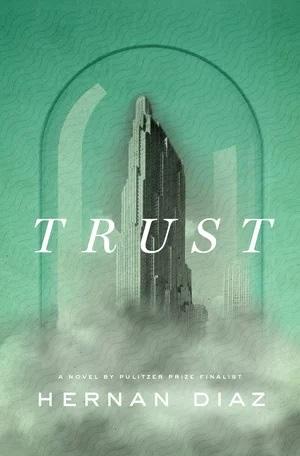
“Trust” by Hernan Diaz is one of those novels that’s always pulling a fast one on a reader. Take the opening section: You settle in, become absorbed in the story and, then, 100 pages or so later — Boom! — the novel lurches into another narrative that upends the truth of everything that came before. That word “trust” in its title is a tip-off that that’s exactly what readers shouldn’t do upon entering the book’s slippery fictional world. “Trust” is all about money, particularly, the flimflam force of money in the stock market, and its potential, as a character says, “to bend and align reality” to its own purposes. The opening section is imagined as a novel-within-a novel, entitled “Bonds,” a 1937 best-seller about the rise of a Wall Street tycoon named Benjamin Rask. Think of figures like J.P. Morgan and Charles Schwab. We learn that Rask is that rarest of creatures, a wealthy man without appetites. Our narrator tells us Rask is fascinated by only one thing: the complexity of the game. For the sake of posterity, Rask does eventually marry — an equally self-contained woman named Helen. Throughout the Roaring ‘20s, Rask accrues wealth and Helen finds her place as a patron of the arts. Then, comes the Crash of 1929. Because Rask profits from other speculators’ losses, rumors circulate that he rigged the Crash and he and Helen are ostracized. The final chapters of this saga detail Helen’s ordeal as a patient at a psychiatric institute in Switzerland; her mania and her eczema, described as a “merciless red flat monster gnawing on her skin,” are reminiscent of the real life torments of Zelda Fitzgerald. The opening section of “Trust” is so sharply realized that it’s disorienting to begin the novel’s next section, composed of notes on a story that sounds like the one we’ve just read. Then, Diaz lures the readers into once again suspending their disbelief when they reach the captivating third section of his novel, which mostly takes place during the Great Depression. There, a young woman from Brooklyn named Ida Partenza becomes the secretary — and ghostwriter — for a financial mogul named Andrew Bevel. Bevel’s life is the source for that best-selling novel, “Bonds,” and he’s so infuriated by that novel, he’s had all copies removed from the New York public library system. Bevel hires Ida to help him write a memoir that will set the record straight. The fourth and final section of “Trust” is wired with booby traps, blowing the whole artifice up before our wide-open eyes. “Trust” is an ingeniously constructed historical novel with a postmodern point. Throughout, Diaz makes a connection between the realms of fiction and finance. The book won in the fiction category of Pulitzer Prizes last year. | 
